Category Archives: CloudNative
Kubernetes – Practice Test / Interview Q&A on Service Discovery

This article represents concepts, revision / quick notes, and practice or sample test/interview questions and answers on Service Discovery topic of Kubernetes. These notes, Q&A could provide to be helpful for those appearing for Kubernetes administrator certification exams (CKA). Revision Notes – Service Discovery Kubernetes supports the following two modes of service discovery: Environment variable DNS Service environment details can be set based on the following format. Service name needs to be in uppercase. {SVCNAME}_SERVICE_HOST {SVCNAME}_SERVICE_PORT When using environment variables for service discovery, it is a mandate that the services must be created prior to the pods which want to access those services. DNS server creates a set of records for each service discovered via watching Kubernetes APIs. Services of type ExternalName can only be accessed …
Kubernetes Interview Questions and Answers – Set 4
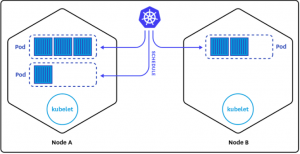
This page represents practice test consisting of objective questions and answers on Kubernetes. This practice test covers the topic such as Pod Lifecycle. The practice test can prove to be very helpful if you are preparing to take Certified Kubernetes Administrator (CKA) certification examination in near future. It covers the Core Concepts from CKA certification exam syllabus. Those preparing for interviews in relation with Kubernetes or cloud-native apps would also find these questions to be useful enough. These questions can as well prove to be useful for interns / freshers / beginners. Revision Notes – Kubernetes Concepts (Pod Lifecycle) A Pod status field is a PodStatus object which has got phase field. The phase of the pod is a simple, high-level summary of where the Pod is in its lifecycle Kubelet invokes …
Container Design Patterns for Kubernetes Pods Design
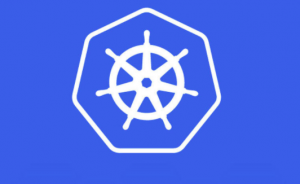
Here is a list of container design patterns which can be used to create useful grouping of containers (atomic unit) such as Kubernetes pods: Sidecar pattern Ambassador pattern Adapter pattern These patterns advocates usage of additional containers to complement the primary / main container and have these containers form an atomic unit. The usage of additional containers as recommended by design patterns are based on some of the following design guidelines: Separation of concerns Containers’ reusability (Cohesive containers); Recall Uncle Bob’s (Robert Martin) single responsibility principle (SOLID) when working with object-oriented programming These patterns results in creation of atomic unit of containers with a set of containers acting as core …
Kubernetes Interview Questions and Answers – Set 3
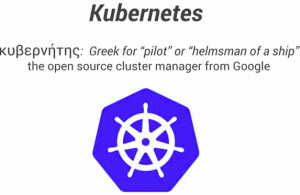
This page represents practice test consisting of objective questions and answers on Kubernetes. The following topics are covered as part of this practice test / quiz: Container hooks and related lifecycle Pods The practice test can prove to be very helpful if you are preparing to take Certified Kubernetes Administrator (CKA) certification examination in near future. It covers the Core Concepts from CKA certification exam syllabus. Those preparing for interviews in relation with Kubernetes or cloud-native apps would find these questions to be useful enough. These questions can prove to be useful for interns / freshers / beginners. Revision Notes – Kubernetes Concepts (Container Hooks / Pods) Kubernetes provides containers with following lifecycle hooks: PostStart PreStop Kubernetes supports implementation …
Kubernetes – Interview Questions and Answers on Pods

This page represents practice test consisting of objective questions and answers on Kubernetes. The practice test can prove to be very helpful if you are preparing to take Certified Kubernetes Administrator (CKA) certification examination in near future. It covers the Core Concepts from CKA certification exam syllabus. Those preparing for interviews in relation with Kubernetes or cloud-native apps would find these questions to be useful enough. These questions can prove to be useful for interns / freshers / beginners. These questions are related with some of the following topics: Kubernetes Pods New feature release in Kubernetes 1.8 such as taints and tolerations The following is link to other practice tests: Practice test on introduction to Kubernetes Practice …
AWS EKS is the Way to Run Kubernetes on AWS ECS
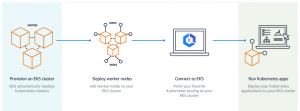
AWS Elastic Container Service for Kubernetes, AWS EKS, is a new AWS fully managed service running Kubernetes out-of-box on AWS without needing to install and operate / manage our own Kubernetes clusters. . Gone are the days when we (63% of Kubernetes workloads as per CNCF spent time and effort setting up and running / managing Kubernetes (Master and a cluster of workers) on AWS EC2 instances with no support from AWS service. Not only this, there was whole lot of high availability requirements in relation with Kubernetes which needed to be managed by running Kubernetes master on different availability zones (AZs). Key Features of AWS EKS Support for existing plugins and …
Kubernetes Interview Questions and Answers – Set 1

This page represents practice test consisting of objective questions on Kubernetes. The practice test can prove to be very helpful if you are preparing to take Certified Kubernetes Administrator (CKA) certification examination in near future. It covers the Core Concepts from CKA certification exam syllabus. Those preparing for interviews in relation with Kubernetes or cloud-native apps would find these questions to be useful enough. These questions can prove to be useful for interns / freshers / beginners. These questions are related with some of the following topics: Introduction to Kubernetes Kubernetes objects Kubernetes controllers Below are other practice tests on Kubernetes concepts such as Pods, Pods lifecycle, Container hooks lifecycle, Kubernetes 1.8 release concepts such as …
Top 6 Container Orchestration Tool for Cloud-native Apps (2017-2018)
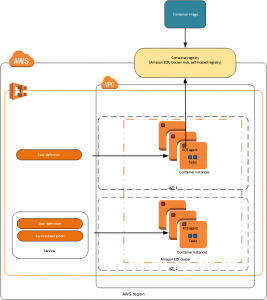
This page represents a list of top 6 container orchestration and management tool which can be used for your next cloud-native apps. Before getting into details, lets look at the trends (Google trends). Trends for Container Orchestration and Management Tools List of Container Orchestration and Management Tools Here is the list of container orchestration and management tools: Kubernetes: Kubernetes is an open-source system for automating deployment, scaling, and management of containerized applications. Following are some of the key features: Automatic places containers based on their resource requirements and other constraints Self-healing Horizontal scaling Automated rollouts and rollbacks Service discovery and load balancing Secret and configuration management Storage orchestration The following …
Kubernetes – When to use Which ServiceTypes?
Kubernetes supports different kinds of service types such as following: ClusterIP: The service of type, ClusterIP, can only be exposed to other services running within the same Kubernetes cluster. The default ServiceType is ClusterIP. NodePort: The service of type, NodePort, can be exposed externally at a static port. The service address would look like NodeIP:NodePort. External APIs can invoke the NodePort services. LoadBalancer: The service of type, LoadBalancer, can be exposed externally using cloud providers’ load balancer. ExternalName: The service of type, ExternalName, is mapped to an external name, such as helloapp.vitalflux.com.
Quick Glance at Kubernetes Architectural Building Blocks
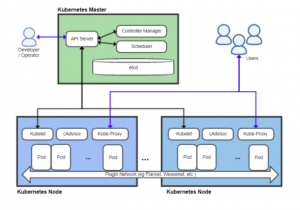
This blog represents information on some of the key architectural building blocks of Kubernetes. The greater details on Kubernetes architecture can be found on this page, Kubernetes Architecture. Following diagram represents technology architecture (with infrastructure) viewpoint of Kubernetes: Following is another viewpoint of the Kubernetes technology architecture: Pay attention to some of the following as per above diagrams: Kubernetes Master Controller Manager (kube-controller-manager): It is a daemon process that embeds the core control loops, a non-terminating loop, for regulating the state of the system. A control loop can also be seen as a controller. Details can be found on this page, kube-controller-manager. Controller manager supports different types of controllers such …
Kubernetes – How to Install Kubernetes on Ubuntu (Linux)
This blog represents steps/instructions on how to setup Kubernetes on Ubuntu (Linux) using Minikube. The instructions have been used to setup Kubernetes on Ubuntu 16.04. Following are key steps which need to be taken in order to setup and get started with Kubernetes: Ensure Virtualization Technology (VT) is enabled in BIOS Install VirtualBox and VBoxManage Install KubeCtl Install Minikube Launch Kubernetes cluster Ensure Virtualization Technology is Enabled in BIOS Setup First and foremost, ensure that Virtualization Technology (VT) is enabled in BIOS setup. In order to do that, do following: Shutdown the system and restart. Keep tapping ESC key when starting the machine. This would bring up the startup screen …

I found it very helpful. However the differences are not too understandable for me